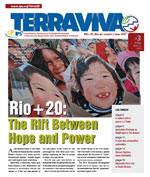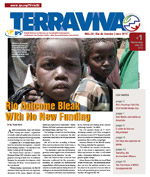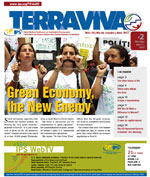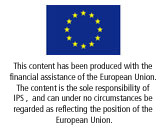By Julio Godoy
RIO DE JANEIRO, Jun 22 (TerraViva) A new study by the London School of Hygiene and Tropical Medicine (LSHTM) presented at Rio+20 shows that overconsumption of food and the obesity it causes, especially in the industrialised countries, threaten not only individual health but the very sustainability of our planet.

The U.S. alone accounts for almost a third of the world’s weight due to obesity. Credit: Don Hankins/CC By 2.0
The study, titled “The weight of nations: an estimation of adult human biomass”, confirms that the population of the United States is the most overweight on Earth.
If the global population had the same age-sex biomass index (BMI) as the U.S., total world biomass would increase by 58 million tonnes – equivalent to an additional 935 million people.
This increase in biomass would lead to higher energy requirements, by 261 kilocalories per day per adult, equivalent to the energy requirements of 473 million adults. Following those extrapolations, the researchers estimate that the global biomass due to obesity would increase by 434 percent.
The study, which calculated the food energy required to sustain human biomass using formulae and other data by the U.N. Food and Agriculture Organisation, warns that the energy required to sustain the biomass due to obesity exacerbates the ecological implications of a steadily rising population.
Ian Roberts, professor of epidemiology and public health at the LSHTM and author of the study, warned that obesity is as much a threat to the environment as overpopulation.
“People tend to think the main threat to the environment is the growing population in developing countries,” Roberts said. “But this measure of biomass is more relevant.
“In considering how many people the world can support, the question is not how many mouths we have to feed, but how much flesh we have to feed,” he added.
The study recalls that the energy requirement of species at each trophic level in an ecological pyramid is a function of the number of organisms and their average mass. In ecology, these factors are often considered together by estimating species biomass, the total mass of living organisms in an ecosystem.
The study estimates the average biomass globally at 62 kilogrammes. North Americans – Canadians and U.S. citizens – weigh an average of 80.7 kg. Europeans weigh an average of 70.1 kg. The study notes that despite only making up five percent of the world’s population, the U.S. accounts for almost a third of the world’s weight due to obesity.
In contrast, Asia has 61 percent of the world’s population but only 13 percent of the world’s weight due to obesity.
“Increasing biomass will have important implications for global resource requirements, including food demand, and the overall ecological footprint of our species,” Roberts warned.
The study’s scenarios suggest that global trends of increasing biomass will have important resource implications and that unchecked, increasing BMI could have the same implications for world energy requirements equivalent to 473 million people.
This increased global demand for food arising from the increase in biomass is likely to contribute to higher food prices. Given the greater purchasing power of industrialised countries, which also have higher average biomass, the worst effects of increasing food prices will most likely be experienced by the world’s poor.
The paper regrets that the concept of biomass is rarely applied to the human species, although “the ecological implications of increasing biomass are significant and ought to be taken into account when
evaluating future trends and planning for future resource challenges.”
As Roberts put it, “Tackling population fatness may be critical to world food security and ecological sustainability.”
The scientist said that people today do not necessarily eat more than 50 years ago. The main problem, he said, is that “we do not move our bodies so much but we are biologically programmed to eat.” To offset this tendency to immobility, he suggested that urban planners conceive cities were it is easier to walk and cycle.
“Everyone accepts that population growth threatens global environmental sustainability – our study shows that population fatness is also a major threat,” Roberts pointed out. “Unless we tackle both population and fatness, our chances are slim.”







 Add to Google
Add to Google







